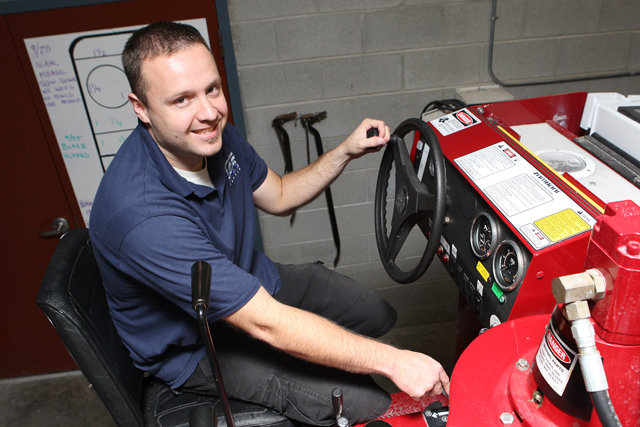Students get paid to do what?
During each break at a hockey game Brandon Forster, or one of four others, drives out onto the ice on his Zamboni.
Every Friday morning, Jeff Morgan wakes up and thinks about whether or not he has time to work that day. If he decides he doesn’t have the time, he just doesn’t work, it’s as simple as that. Billie Curtis gets paid to eat cheese.
How do these students get these jobs? Do they really get paid for this stuff?
Curtis, recent alumna in ornamental horticulture, has one of the more unique jobs on campus. Curtis, along with 12 others, works four hours a week as a cheese taster. After reading a flyer by the Veterinary Science building in January 2008, Curtis applied for the job and went through four months of training, learning how to recognize flavor attributes. She and the others learned to rate the cheese attributes such as bitterness and saltiness.
Curtis said she is enjoying her part in this two-year study, and hopes to qualify for other sensory studies when she is done. She says she has learned a lot and notices how things taste differently, such as aged Parmesan which has a pineapple-type taste.
Morgan, sophomore majoring in liberal arts, has worked as a substitute teacher in the local school districts for almost two years. He says he was interested in substitute teaching so he asked a teacher how to get in on it.
“I just needed to make some extra money,” he said, “and I thought it would be fun.”
Because he feels more comfortable with older kids, Morgan said he prefers to substitute high school classes.
“It’s always embarrassing when I go into a freshman classroom and they’re all taller than me,” he said. “I have to ask them to turn on the TV because I can’t reach it.”
As a substitute teacher, Morgan said it is easy to pick the subjects preferred to teach. He said he avoids math because they ask hard questions.
Despite the embarrassing moments, Morgan said he likes his job.
“I love that it’s so easy and so flexible,” he said. “Plus, it pays pretty well for what it is.”
Kelly Services, located at 200 E. 1300 North in Logan, is where both school districts in the valley go for their substitutes teachers. Allison Fullmer, substitute staffing specialist at Kelly Services, said there are about 350 substitutes teachers in the valley, and new teachers are hired throughout the year.
“We get a lot of college students who want to get their foot in the door and get experience,” Fullmer said.
Emily Bott, senior majoring in liberal arts and sciences, received an e-mail from her sister five months about secret shopper openings in Cache Valley. Knowing that she could use an extra bit of cash, Bott said she signed up and started being assigned places to shop.
While she can be assigned a number of different places, Bott said she has mostly been shopping at one particular store.
“I like that they don’t know that I’m the secret shopper,” she said. “It’s mysterious.”
Forster, junior majoring in Spanish education, is a supervisor at the Eccles Ice Center in North Logan. As a supervisor, Forster runs the front cash register, monitors employees, works the concession stand, rents skates and helps out in the pro-shop. He also drives the Zamboni, the $80,000 machine that resurfaces the ice.
Forster said there are only five people qualified and trained to drive the Zamboni, which gets driven at least six times per day.
“It takes two to three months before you’re comfortable enough to just get out there,” Forster said.
Songs have been written about Forster’s job, including “Zamboni” by The Gear Daddies, which Forster says is often played while he is out resurfacing the ice between periods at hockey games. Forster said kids really like to watch him drive and they always try to get him to wave.
Lindsay Bagley, sophomore majoring in physical education, said she started donating plasma at PCCI when she realized she had no money.
While many people are afraid of needles, Bagley said donating plasma doesn’t hurt anymore than donating blood.
“It’s really easy,” she said. “You can sit there and watch movies or do homework and nobody bugs you.”
Chris Healey, vice president of government affairs at Grifols, the plasma research and development company over PCCI, said that plasma donations help to develop life saving, necessity medicines.
Donors can donate plasma as frequently as twice a week, but Healey says that the average donor donates just once a week.
–kandice.crompton@aggiemail.usu.edu

